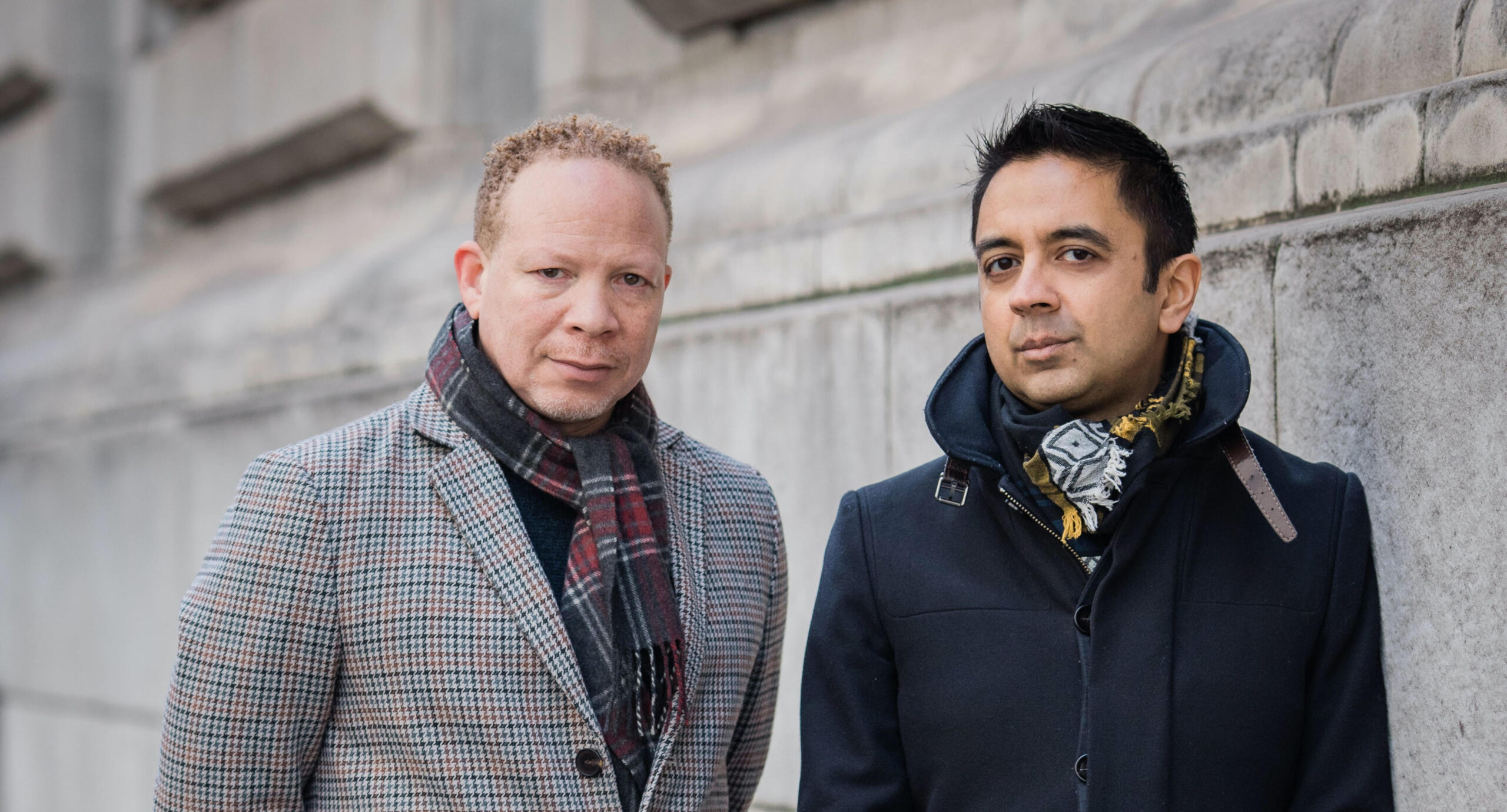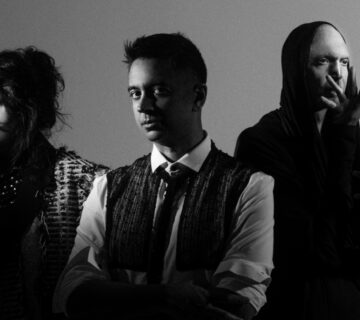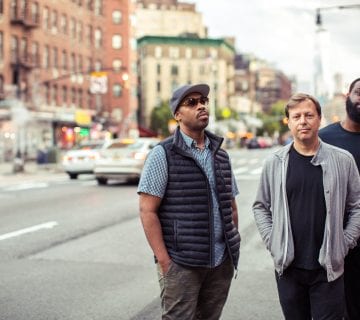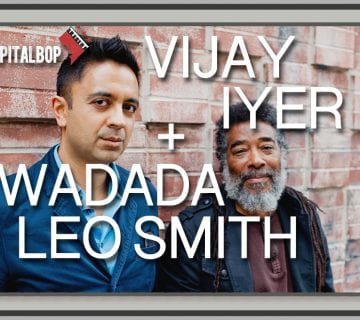The last time Vijay Iyer and Craig Taborn played together was at the Wigmore Hall in London, in September 2019. They were wrapping up a tour celebrating their first duo album, The Transitory Poems, recorded live at the Liszt Academy of Budapest the year before. It had received high praise from across the jazz and creative-music worlds. The music they’d captured in Budapest – offered in tribute to forebears like Muhal Richard Abrams, Geri Allen and Cecil Taylor – is challenging yet very human; expansive yet welcoming; ever-changing but focused. When they reconvene at The Philips Collection this Sunday, for their first duo concert since the coronavirus struck, the music could be quite similar. Or it may end up being very different.
Individually, these two intense, imaginative musicians – who were voted, respectively, the pianist (Iyer) and keyboardist (Taborn) of the year in JazzTimes‘s 2021 Expanded Critics Poll – make music that’s a product of many things. But in these duo settings, it often comes down to the nature of the space itself, and how the two have grown as individuals since their last meeting. In a joint interview via Zoom earlier this month, Taborn described their collaboration as “interactive and collaboratively creative.”
Iyer added: “What we do is so relational, and that involves the specific instruments that we’re on and that specific space we’re in and the affordances of that particular scenario. Each [performance] feels really site-specific in that way.”
The pianists have some history in common. They each served in bands led by saxophonist and composer Roscoe Mitchell, and played across one another in a Mitchell ensemble called the Note Factory, from the 2000s, which used pairs of drummers, pianists, etc. They each see what they do now as a kind of continuation of the cutting-edge music-making that Abrams, Taylor, Allen, Mitchell and so many others have pursued over the last 60-plus years.
In their joint interview, the two provided an intimate look into their creative thinking. And while this was still an interview – Taborn on video from his home on the West Coast, Iyer from a hotel room in Italy, myself in D.C. – it often fell into being a fluid conversation between just the two of them, about their shared artistic pasts and processes.
In-person tickets to their show on Sunday are sold out, but tickets can still be purchased for a live stream of the event at the Phillips Collection’s website. (This interview has been lightly edited and condensed for length and clarity.)
CapitalBop: When was the last time you two played together?
Vijay Iyer: I was trying to remember that too. Did we do something in the fall of ’19? I mean, the album came out in the spring of ’19, and we did a few dates around that.
Craig Taborn: Was our Winter Jazz[fest]–
VI: That was in January of ’19. We did a tour I think in March…
CT: In the fall, we did London: the Wigmore. That was fantastic! I went back there — I was teaching right before Covid, in February 2020, at the Royal Academy, and I just was eating by there one evening. And I wandered in there and I saw that guy Jonathan Biss, who was doing his Beethoven thing. He killed it, and I was able to hear how great pianos sound from the house.
VI: That’s one of those halls where classical musicians I know — they call that their favorite place in the world to play.
CB: What does time apart from each other do to how you perform the next time in the duo setting — especially with a gap like this? Or does it make a difference?
CT: I would hope for myself — and I think we share this — that because our practice is interactive and collaboratively creative, that whatever happens during that time inherently informs what we’re gonna do. I was just thinking about this…. Vijay is finishing an extensive trio tour and I’m finishing a three-week solo tour, and I’ve been doing a lot of other gigs as well. I had the thought that we’d both be coming in relatively hot — which isn’t always the case! [Both laugh]
So, I was excited. We’ve been doing a lot of other music pretty intensively, which wouldn’t have even been the case six months ago. It’s interesting that we’re reconvening at a point post-Covid where we’ve both been able to be playing a lot. So, I was thinking about that: ‘Oh, Vijay is gonna be on it!’
‘There is something about the immediate conversational aspect of having a duo, as opposed to even a larger group. It’s sort of the most intimate musical configuration you can achieve.’
-Craig Taborn
VI: I also think with all the kinds of collaborations we’re involved in, including our own groups, there’s often this sort of: You veer apart and then you reconvene. You sort of pick up where you left off, but because everyone has grown in the meantime and taken in other information, then everything is richer because of it. That’s a best-case scenario.
CT: Yeah, exactly. That’s owing to the fact that we have a trust. I know all of those things will be allowed and engaged. It’s like reconvening with any sort of relationship, and part of it is: ‘I was checking this out,’ or, ‘I had this experience,’ and you can bring that into the music and that really informs the performance and what we’re going to create.
VI: Yeah, our real warmup was that time in November, when we ran into each other in the lounge at JFK!
CT: Oh, that’s right!
VI: We were both heading out to Europe at the same time. We hadn’t seen each other since pre-pandemic.
CT: That definitely was a nice send-off for that, too, because that was the first extensive tour I had been doing — and I think you too…. I remember Mary Halvorson was there.
VI: Mary, Adam O’Farrill, Christian Sands. It was a party in the JFK Delta Lounge! Everyone was stepping back into the water.
CB: Oh, so this is where the brain trust meets, the Delta Sky Lounge at JFK! When you do reconvene — specifically at the Phillips, but also in general — do you share ideas beforehand, or is it more of an unfolding in the moment? Is it very compositional in real time?
VI: It is very compositional in real time. But a lot of it, because what we do is so relational and that involves the specific instruments that we’re on and that specific space we’re in and the affordances of that particular scenario, each one feels really site-specific in that way…. The thing with piano is that it is such an environmental instrument anyway. It radiates. It’s almost like you’re playing the room. You’re not just playing something compact that you hold in your hand. Because of that, we’re almost like chameleons; we’re adapting to the space we’re in, and that then leads us into a different kind of space from the last time.
I know both of us are really attuned to that, and we really take that time to kind of melt into the space, into the environment, and that often brings out very specific things. So, it’s not like: “Let’s play that thing we played last time,” or, “Let’s play that thing on the record.” There’s never been anything like that. There was a time when we were playing some of those Geri Allen pieces, and one of them is on the album. That may happen again, but even when we do play them it’s sort of like it just emerges from what we’re already doing.
CT: Years ago, when we started doing the duos, we were exploring possible process vectors. And I remember for one of the first ones we wrote words.
‘You can sense people breathing and you’re riding that. That becomes form: environment as form and context as form.’
-Vijay Iyer
VI: Yeah, that was at Miller Theater [at Columbia University]. We had a bunch of clips of paper with key words — just words on them or phrases, and we kind of put them in a hat and drew out, so we each had a little deck of prompts. That was probably 2013.
CT: Those things can do a thing. We haven’t really talked about it much … but I think the more you’re improvising in these contexts and the more you trust the other person to also sort of be in a sort of headspace, a lot of that work is done anyways…. If you are attendant to that and have a compositional, architectural sensibility anyway — which I think we do — then the work of pendulating or finding shapes and endings and closures kind of happens anyways. I think we sort of stopped doing that [using prompts] pretty quickly.
VI: It was something, in a way, that we had to pass through in order to realize: “Oh yeah, we already have some kind of armature that we can just draw from within” — like some sort of scaffolding. That’s also just tapping into the mystery of the moment. And not to be too esoteric or something, but there is what’s happening within and there’s all the levels of that in terms of internal emotional processes, physiological processes. Then there’s the energy of people in the space, and you can sense people breathing and you’re riding that. That becomes form: environment as form and context as form. Then you make choices that confirm or complicate those existing dynamics and patterns.
CB: What do you value about the duo setting, and what it allows and demands from both of you?
CT: There is something about the immediate conversational aspect of having a duo, as opposed to even a larger group. It’s sort of the most intimate musical configuration you can achieve interactively. Once you add a third person, it complicates the layers of negotiation. Like any kind of dinner party. It’s just that possibility of engagement.
I always say this, because the piano thing is a factor that adds a lot of interest. That’s less of a consideration for me for a lot of these kinds of things than it is just making music with Vijay. I think it’s much more about us interacting than trying to negotiate the piano issues; because the piano’s compass is wide enough and it has enough possibility that you can always work around any sort of things that way. It’s more how the musicians engage.
VI: There’s what the instrument does, there’s what the space does, but then there’s what we do and what we’re into and what we latch onto: how we listen. I feel like often when we’re playing duo — when Craig and I are playing duo — it’s kind of like we’re bringing up these topics that we know we’re both into. Like, “Oh, check this out! Hey, have you heard this? What do you want to do with this?” It’s very —
CB: Playful, in a way?
VI: Well, it’s more than playful, because there’s this sense of responsibility and accountability to the people who are gathered there. It’s not just an indulgence. I think because we’ve known each other for so long and have made music in so many different ways together — like in Roscoe’s band, for example, back in the early 2000s — we have a lot of common points of reference that we can kind of instantiate. I don’t want it to be like, “Oh, there are so many styles we’re drawing from.” It’s not so much that. It’s just that there’s this creative music continuum that’s, like, Black music of the late 20th and 21st century, and particularly like the cutting edge of all that, that we’ve been associated with and connected to in very real ways. So, it’s more like: “Hey, remember that time Roscoe did this?” It’s that kind of conversation. Even when we would play Geri’s music, it’s like, “Remember this great thing about Geri?” It’s cherishing this shared legacy.
CB: I am glad you brought up Roscoe Mitchell, because I was going to ask about that era. When you two played in his group the Note Factory together in the 2000s, what did you notice about the way you played together in that group? What stood out to you about the way you learned to collaborate in that setting?
VI: [Laughs]
CT: Well, for people who don’t know the context of the Note Factory, it’s an ensemble of pairs, meaning there are two drums, two basses, two pianos and an assortment of horns. It’s been Roscoe and a trumpet, but I’ve done it with trombone and Leroy [Jenkins] once, I think back in the day. The first concert I ever did with him was Leroy and George [Lewis]. So that context is already potentially very dense, but it’s also the factor that, in what would be a more normal density of instruments, you’re also having your same instrument mirrored in a lot of spaces.
But the requirement with Roscoe is often to contribute volitionally, fluently and relatively consistently, to a large extent. He wants you in the music at all times, but it’s also important to maintain transparency in that context. The things you learn in that group in particular are just how that can work. I can remember just a rehearsal with Roscoe where he would say, “Okay, let’s try to get these notes happening” — you know, the “flying notes” thing — and, “Let’s stay out of each other’s way.”
VI: “Keep those notes flying, Vijay!”
CT: Yeah! Keep those notes flying, but let’s stay out of each other’s way. You’re parsing the information in space at a very high rate, and trying to retain identity and a clarity of your own idea — which is extremely important. Roscoe will stop you if you’re not doing it. He can parse that. In an ensemble of nine people, he can hear it: It’s not a random, “just play anything” kind of space. He’ll stop you immediately and: “You didn’t know what you were doing.” And “It’s just muddling up the context.” That’s the biggest thing, and I think what we extended from into in this duo is just that work of learning to hear each other. Because of the fact of timbre and just the instrument itself in that context, I think I was aware of everyone — but I was aware of what was happening with the pianos as a thing to try and not overbalance or underweight in that whole context.
VI: Right, right. And I think what was pretty key. My first tour with Roscoe was a quintet tour. Matthew Shipp had bowed out at the last minute and Craig couldn’t do it so you recommended — and I think George also recommended — me.
CT: Yeah, [Mitchell] had gotten your name from a lot of people.
VI: Then it was like a trial by fire because I got thrown into this band of people that didn’t know me. I mean, I knew them — like, I had followed their music for years, and I had seen Roscoe many times. That was like 2001.
CT: So was it was like Jaribu [Shahid], Tani [Tabbal].
VI: Jaribu, Tani, Spencer [Barefield] and me.
CT: Oh, that was the thing! So, it was the band he had for 30 years, and then you.
VI: They had been playing together their entire adult lives, and then this random kid — and they didn’t know me from Adam. In fact, it was in Italy. I’ll never forget it because it was this two-week tour of Italy. It was so funny because it was pre-9/11 and you could actually just fly under someone else’s name. So, they gave me Matthew Shipp’s plane ticket. [Laughs]
CT: Oh man! I didn’t know all of this.
VI: It was funny because then Matthew’s name was still on everything, like all the posters and programs. I remember Roscoe was looking at one of these programs and was like, “Yeah, Vijay. Matthew done fucked you good man.” [Laughs] My name was nowhere! But it was so transformative for me. I remember those first couple of nights it was like that: Like, “No, you’re not actually hearing. You think you know how to do this — like it’s an open, free context. But actually, there are some very specific, stringent guidelines.” I don’t know if “requirement” is the right word.
CB: Scaffolding?
VI: Yeah, or sort of like heuristics, or what ways that you function and what he was trying to avoid. Like a certain kind of build-up, a certain kind of density, which could be a problem. With piano, the first thing people want to do is play chords, right? And that blocks the flow of things. Then, the following thing: He doesn’t want to hear some real facile call-and-response kind of stuff. Like, “Oh you played that, I’m gonna pay your shit back at you.” He didn’t want that ever. Even any whiff of it. You might find yourself doing it unconsciously; if he heard you doing that, he’d tell you to stop playing. So, he kept telling me to stop playing! Those first couple of gigs, I was just — “ahhh!” And there was also all this intricate, very difficult, notated music. So, it’s not even just the open stuff it’s also very, “Can you read this very complex atonal stuff?” Then, probably on the third night, something happened to me and I actually started playing in a way that I had never heard myself play. It was this other river, like this underground river burst forth into the world. Like, “Who is this?” I became a different person. Something similar, I imagine, must have happened to you, Craig, and so I think what was interesting when we came together in that context is that we both, separately, had been through those rigors and come through, grown somewhat, and encountered each other at that level. We both — in our own, independent and very authentic, organic way — had risen to that challenge. And so we could deal with each other in that sense, having passed through it, and hear each other at that level.







Join the Conversation →